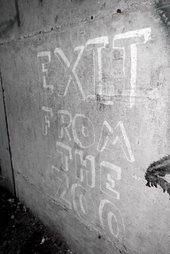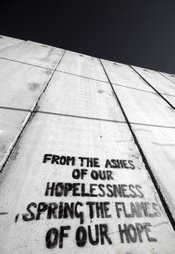Checkpoint 300
Checkpoints are a daily reality for Ahmad. Ahmad with his wife and six children live in a small but cozy two room apartment in Dheisheh refugee camp. On their wall, interjected between time worn pictures of beloved family members who live in Gaza that Ahmad and his family haven’t seen in over ten years, hangs a rusted key. It’s large and iconic. Symbolic and sublime. Rusted by time and tempered with the flame of creative nonviolent resistance. It is a constant reminder of the Palestinian right of return, ensured by United Nations resolution 194 but never implemented thus far. Ahmad’s 6 year old daughter, Haleema, grins and giggles as she responds with boldness and pride: “Artas!” when she’s asked the name of the village that her grandparents and great and great great and even great great great grandparents are from. Where she is from.
Her grandparents were expelled from Artas in 1948 as Israel committed wholesale ethnic cleansing of much of Mandatory Palestine under the cover of regional war. Hundreds of thousands of Palestinians fled or were driven from their homes and farms to decrepit refugee camps in parts of Jordan, Egypt, Lebanon, Syria, and what would become known as the West Bank and Gaza Strip. Today there are over 5 million Palestinian refugees. None of which have been given the right to return to their original villages. Once there was a house with a door where the rusted key that hangs on the wall fit into. To be a Palestinian refugee is to remember. Memory is the closest thing that Palestinian refugees have to identity and self determination.
Ahmad makes his living as a day laborer in Jerusalem. Each morning Ahmad wakes at 3am in order to arrive at checkpoint 300 at 4am. By the time he gets there the line to enter the checkpoint which is supposed to open at 5am but usually doesn’t until after 6am is already hundreds of people long. The permit he was lucky to receive from the Israeli government allows him to travel into Jerusalem and work from 5am to 7pm. If he returns late, even once, he will lose his 3 month work permit which he paid 2,000 shekels for ($500). Over the course of the year Ahmad will pay $2,000 simply to be able to travel into Jerusalem—a fifteen minute drive—to work.
There are many different kinds of checkpoints throughout the West Bank ranging from earth mounds and crude roadblocks manned by IOF’s (Israeli Occupation Force) to massive compounds complete with 27ft walls, sniper towers, turnstiles, metal detectors and manned by heavily armed IOF’s. Checkpoint 300 in Bethlehem is one of the largest and most imposing. It is the checkpoint between Bethlehem and Jerusalem. In order to leave or enter Bethlehem Palestinians have to cross through checkpoint 300. Setting aside the fact that lines to pass through the checkpoints commonly stretch hundreds of meters and that there are regular multi hour delays and the fact that Palestinians are frequently not allowed to pass through for petty and arbitrary reasons, any Palestinian that wishes to pass through checkpoint 300 into Israel must obtain a permit. What this means is that Palestinians must apply for a permit through the Israeli government. As you might imagine actually obtaining a permit is near to impossible.
We were there today. At 5am we were there. At checkpoint 300. As the sun rose over the horizon the line that was already hundreds of meters long continued to grow. Today was a good day. The checkpoint opened on time. Palestinians young and old were still herded like animals, some were still turned away to return to their families having made nothing for the day, and everyone was forced to wait hours to take a 15 minute trip to work. But today was a good day.
…


2 comments:
i have just come back from Mexico where i was working on setting up some Xtreme experiences for this year's Mexico team...=)
now i have so much to catch up on!
blessings
My new I/P friends from the BuildaBridge Institute had to do this daily ritual, as well. They will have to apply for a permit to be married once they return, since one is a Palestinian from the West Bank and the other an Israeli from Jerusalem. What a witness to the world of the power of perseverance and love to overcome any human-made obstacle.
Post a Comment